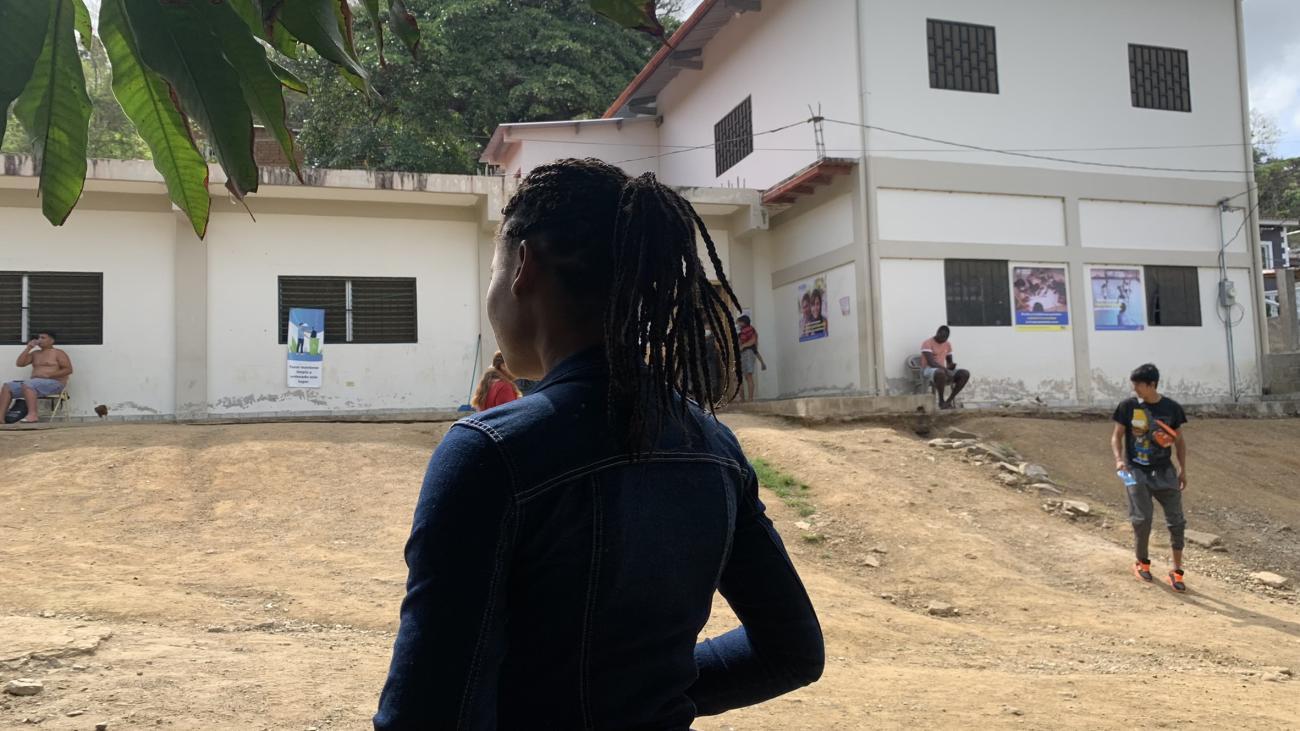Resident Coordinator leads diplomatic and humanitarian efforts to support migrants and refugees in transit through Honduras

180 kilometres from Tegucigalpa, the capital of Honduras, lies Trojes, a small municipality on the border with Nicaragua. In the last year, Troje's streets have been covered by the footsteps of thousands of refugees and migrants seeking better livelihood opportunities and a safe place to live.
"I left because my country is not so good now, there is no security. [My family and I] no longer felt safe," says Witney*, a 22-year-old Haitian, who is part of the refugee and migrant flows that pass through Honduras in the hope of finding protection and peace in another country
According to official data from the Honduran National Migration Institute, in 2022 at least 118,497 people have entered the country through irregular passages, marking a sharp increase from the previous year. This growth in the rate of ‘mixed movements’ — a term which refers to flows of people travelling together, using the same routes and means of transport but for different reasons — has posed significant challenges to the country’s response capacity.
On several different occasions, the UN Resident Coordinator in Honduras, Alice Shackelford, visited communities along the southern border to learn firsthand about the situation facing refugees and migrants in the area and meet with government entities, humanitarian agencies and civil society organizations to coordinate protection efforts.
After her visit to the border region, the Resident Coordinator emphasized the importance of showing solidarity with communities on the move.
"Migrants are people — including many women, men, boys and girls — full of hope, who have endured pain, violence and long journeys (...) The solidarity and the love shown by local communities such as Las Manos, Danlí and others are fabulous and ought to be celebrated.”
Diplomacy efforts to support migrants and refugees
Given the increase of people transiting through Trojes, some churches have been temporarily transformed into shelters where people of different nationalities, ages, races, beliefs, languages, and backgrounds cross paths.
One of these shelters, the Church "Jesus is alive", which had been providing support to migrants and refugees since the beginning of the year, serving an estimated 350 people daily, was due to close in July 2022. Thanks to diplomatic efforts by the Resident Coordinator and her advocacy with the Bishop of Danlí the shelter will remain open until the end of 2022.
Shelters such as “Jesus is Alive” have become key sources of support for migrants and refugees whose journeys have stalled in Honduras following the introduction of a new migratory fine.
Most people and families who enter the country irregularly cannot pay the $240 fine. They are forced to remain in the country without the possibility of earning income to cover their main needs or continue their journey.
In May 2022, the National Congress approved an immigration amnesty so that migrants in transit would not have to pay the fine established by law for irregular entry into the national territory. However, it still required the approval of the government’s executive branch to go into effect. After carrying out many diplomacy efforts with Government officials with the support of the Country’s Humanitarian Response Group, the amnesty was made effective at the beginning of August. This measure helped to alleviate the precarious situation of people on the move.
The Resident Coordinator welcomed this "important step for the defense of migrants and their human rights" and thanked the Parliament for "recognizing that Honduras is a transit country for irregular migration and not only a country of origin".
Humanitarian Assistance
But the challenges don´t stop there. Migrant and refugee families continue to arrive in Honduras and are in constant need of humanitarian assistance and support.
Together with national authorities and partner organizations, the UN Country Team in Honduras, which is led by the Resident Coordinator, is working in a collective and coordinated manner to provide needs-specific humanitarian solutions across the southern border regions.
Jorge Peraza, the former IOM Head of Mission for Guatemala and Honduras who was recently preceded by Nicola Graviano, explained some of the challenges faced at the shelters. "Capacities are limited and the available spaces [at the shelters] do not meet the minimum requirements for migrants and refugees to be housed in dignity."
UNHCR has led the coordination of the response through the Protection Cluster, the Humanitarian Country Team, and the local Response Team for the southern border of Honduras. Through this coordinated response, IOM has submitted a proposal for structural improvements to the facilities and purchasing gas cylinders for food preparation. UNHCR has also provided shelter and delivered hygiene and biosecurity kits to reinforce COVID-19 prevention measures. UNICEF set up a special shelter at the Temporary Rest Center to ensure children, adolescents and families receive dignified and humane care.
In coordination with the Government of Honduras, the UN Country Team continues to gather information to better understand the needs of displaced persons and offer solutions tailored to their current situations.
"It is necessary to keep pulling efforts to ensure a coherent response for refugees and migrants needing assistance and protection", explains Andrés Celis, UNHCR Representative in Honduras.
"It is also worth underlining the solidarity displayed by local governments and inhabitants in border areas where migrants and displaced persons stop in transit," adds Mr Celis.
"Communities always teach us the real meaning of solidarity", he concludes.
* Last names were omitted for privacy and protection concerns.
This story was originally written and produced by Maria Elena Cálix, RCO Communications and Advocacy Officer and Ismael Cruceta, IOM Press Officer. Danielle Alvarez Ñavincopa, UNHCR Associate Communications Officer, provided editorial support. Edits were implemented by the UN Development Coordination Office.
To learn more about the UN's work in Honduras, please visit: Honduras.UN.org.













